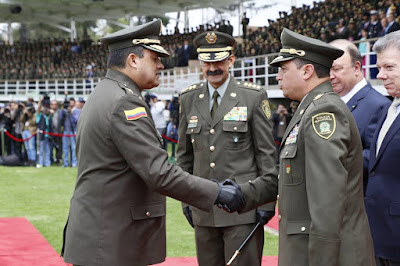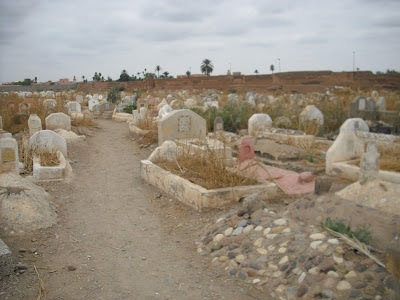It wasn't quite billed as a clash of titans, religion versus science, but with the Rocky walk-on music, it hinted that we might be in for something special.
In the end, what we got was a rather tame affair — shadow-boxing if you will. There were a few reasons for that. For one, the format certainly didn't help.
After opening statements, each man was given separate, alternate questions to answer. So it made it difficult for a robust, heated encounter to develop. A time limit on those answers would have done no harm either.
Another reason why sparks weren't exactly flying is that the opposing sides weren't actually that much opposed to each other — at least that's how it appeared.
We're referring to Javeriana University Bogotá's "debate" titled 'Is God an illusion?' (¿Es Dios una ilusión?).
In the end, what we got was a rather tame affair — shadow-boxing if you will. There were a few reasons for that. For one, the format certainly didn't help.
After opening statements, each man was given separate, alternate questions to answer. So it made it difficult for a robust, heated encounter to develop. A time limit on those answers would have done no harm either.
 |
| Clash of the heavyweights - well, not quite ... |
Another reason why sparks weren't exactly flying is that the opposing sides weren't actually that much opposed to each other — at least that's how it appeared.
We're referring to Javeriana University Bogotá's "debate" titled 'Is God an illusion?' (¿Es Dios una ilusión?).
The protagonists were Colombian Jesuit priest and author Father Gerardo Remolina and the British evolutionary biologist, author and atheist Professor Richard Dawkins.
We more or less knew what we were going to get from Dawkins.
It was Fr Remolina who surprised us somewhat. He basically came across as a man of reason and some science who just happened to have made a good living from something he doesn't entirely believe in. Or if he does fully believe in it, he's not very convincing.
He effectively reduced all the core tenets of Catholicism to symbols. 'Is God an illusion?' 'Well, what is God?' 'Eh, you tell us, Father.' 'Does heaven exist?' 'Well, what is heaven exactly?' OK, we're using a bit of poetic licence here but many of his answers to questions that are at the core of Christianity were abstract, to say the least.
This aspect to proceedings did not surprise us. He had a fair idea of the gallery he was playing to. (In one way, at the risk of being facetious, it was like the 'That would be an ecumenical matter' scene from the Irish sitcom Father Ted.)
It would have been much more entertaining to have a fundamentalist Christian from Bible Belt USA on stage. A creationist to the core. Their phoney arguments are much more engrossing.
We more or less knew what we were going to get from Dawkins.
It was Fr Remolina who surprised us somewhat. He basically came across as a man of reason and some science who just happened to have made a good living from something he doesn't entirely believe in. Or if he does fully believe in it, he's not very convincing.
He effectively reduced all the core tenets of Catholicism to symbols. 'Is God an illusion?' 'Well, what is God?' 'Eh, you tell us, Father.' 'Does heaven exist?' 'Well, what is heaven exactly?' OK, we're using a bit of poetic licence here but many of his answers to questions that are at the core of Christianity were abstract, to say the least.
This aspect to proceedings did not surprise us. He had a fair idea of the gallery he was playing to. (In one way, at the risk of being facetious, it was like the 'That would be an ecumenical matter' scene from the Irish sitcom Father Ted.)
It would have been much more entertaining to have a fundamentalist Christian from Bible Belt USA on stage. A creationist to the core. Their phoney arguments are much more engrossing.
It's not for nothing that the influence of the traditional Christian churches is on the wane. These new guys on the block have a far sexier story to sell. And selling it they certainly are. There's money in that crucifix, you know. (They definitely would have felt at home with the Rocky entrance music anyway.)
Of course, religion's greatest strength in the face of rigorous scientific enquiry is the comfort it provides. It's a release from the trials and tribulations of this mortal world we toil in.
It tells us that there is something more than our present existence, something greater. It can give hope in the midst of despair. Who cares if the evidence suggests otherwise? Remember, 'happy are those who have not seen yet still believe.'
Stony-faced science, in contrast, can leave us cold. Take Dawkins' rebuttal to that comforting aspect of religion, quoting the Canadian cognitive psychologist Steven Pinker: 'If you're being chased by a tiger it may comfort you to believe it's a rabbit. But it's a tiger and it's going to eat you.' Doesn't tend to leave one all that chirpy, does it?
Yet, science isn't in the game of emotions. It's about truth-seeking. Fantasy and fiction, on the other hand, by definition operate without the inconveniences of having to prove themselves. In this regard, a fantastical story of everlasting life is generally going to appeal more than the theory that when we die, that's it.
Religions across the world, despite the many glaring holes and contradictions in their stories (it's not called 'having faith' for nothing), still trump atheism.
Thus, when asked if he felt we were coming near the end of religion, Dawkins said he can only hope that that's the case. The reality, however, suggests we're still some way off that juncture at this stage in our development as a species.
Some people might ask, 'So what? What's the big deal?' As we wrote about before, getting personal comfort, strength even, from belief in a higher power is one thing — what you do in private is your own business after all. Forming whole societies based on religious doctrine that doesn't stand to reason is quite another thing.
We're not going to take up space here disputing the argument that a religion-free world would be some sort of immoral, violent backwater.
Coming back to comfort, it's not like an atheist is devoid of it. Science can provide it. And it's arguably a more reassuring one than what religions offer because it comes more from fact.
Take an individual's very existence. It's a remarkable achievement in itself when we consider all the things that had to happen by chance to actually get us on this planet. Isn't that something worth celebrating and living for? Not to mention making the most of it for the short period we are here.
What's more, it could be argued that parents have a lesser need for religion than childless, singletons (even if, in reality, the opposite seems to be the case). Who needs a god or organised religion when you have your children and later, perhaps, grandchildren to get behind, your raison d'être?
So a world without religion doesn't have to be a gloomy, hopeless, meaningless place.
Of course, religion's greatest strength in the face of rigorous scientific enquiry is the comfort it provides. It's a release from the trials and tribulations of this mortal world we toil in.
It tells us that there is something more than our present existence, something greater. It can give hope in the midst of despair. Who cares if the evidence suggests otherwise? Remember, 'happy are those who have not seen yet still believe.'
Stony-faced science, in contrast, can leave us cold. Take Dawkins' rebuttal to that comforting aspect of religion, quoting the Canadian cognitive psychologist Steven Pinker: 'If you're being chased by a tiger it may comfort you to believe it's a rabbit. But it's a tiger and it's going to eat you.' Doesn't tend to leave one all that chirpy, does it?
Yet, science isn't in the game of emotions. It's about truth-seeking. Fantasy and fiction, on the other hand, by definition operate without the inconveniences of having to prove themselves. In this regard, a fantastical story of everlasting life is generally going to appeal more than the theory that when we die, that's it.
Religions across the world, despite the many glaring holes and contradictions in their stories (it's not called 'having faith' for nothing), still trump atheism.
Thus, when asked if he felt we were coming near the end of religion, Dawkins said he can only hope that that's the case. The reality, however, suggests we're still some way off that juncture at this stage in our development as a species.
Some people might ask, 'So what? What's the big deal?' As we wrote about before, getting personal comfort, strength even, from belief in a higher power is one thing — what you do in private is your own business after all. Forming whole societies based on religious doctrine that doesn't stand to reason is quite another thing.
We're not going to take up space here disputing the argument that a religion-free world would be some sort of immoral, violent backwater.
Coming back to comfort, it's not like an atheist is devoid of it. Science can provide it. And it's arguably a more reassuring one than what religions offer because it comes more from fact.
Take an individual's very existence. It's a remarkable achievement in itself when we consider all the things that had to happen by chance to actually get us on this planet. Isn't that something worth celebrating and living for? Not to mention making the most of it for the short period we are here.
What's more, it could be argued that parents have a lesser need for religion than childless, singletons (even if, in reality, the opposite seems to be the case). Who needs a god or organised religion when you have your children and later, perhaps, grandchildren to get behind, your raison d'être?
So a world without religion doesn't have to be a gloomy, hopeless, meaningless place.
Remember, it's only in recent years that the more established religions, from a Christian perspective in any case, 'jazzed up' their message to the masses. In the not-too-distant past, the stick was preferred to the carrot. 'It's God's will or it's eternal damnation.'
Atheism can be appealing, too, liberating even. Don't dismiss it right out of hand.
________________________________________
Facebook: Wrong Way Corrigan - The Blog & IQuiz "The Bogotá Pub Quiz".
Atheism can be appealing, too, liberating even. Don't dismiss it right out of hand.
________________________________________
Facebook: Wrong Way Corrigan - The Blog & IQuiz "The Bogotá Pub Quiz".















